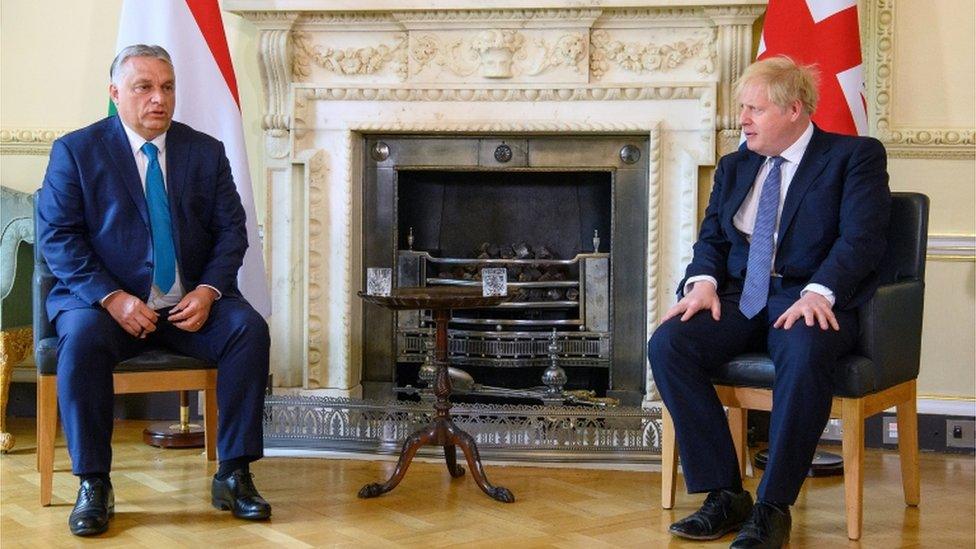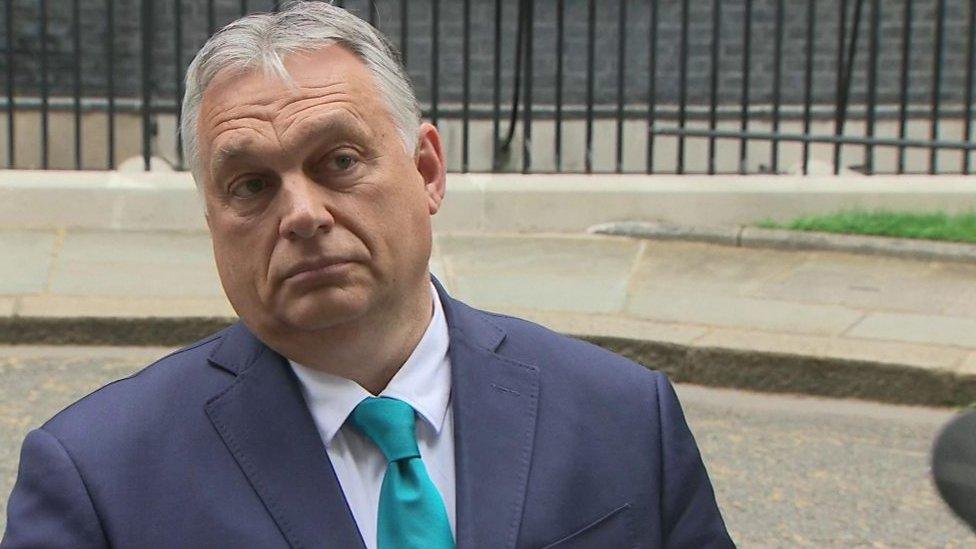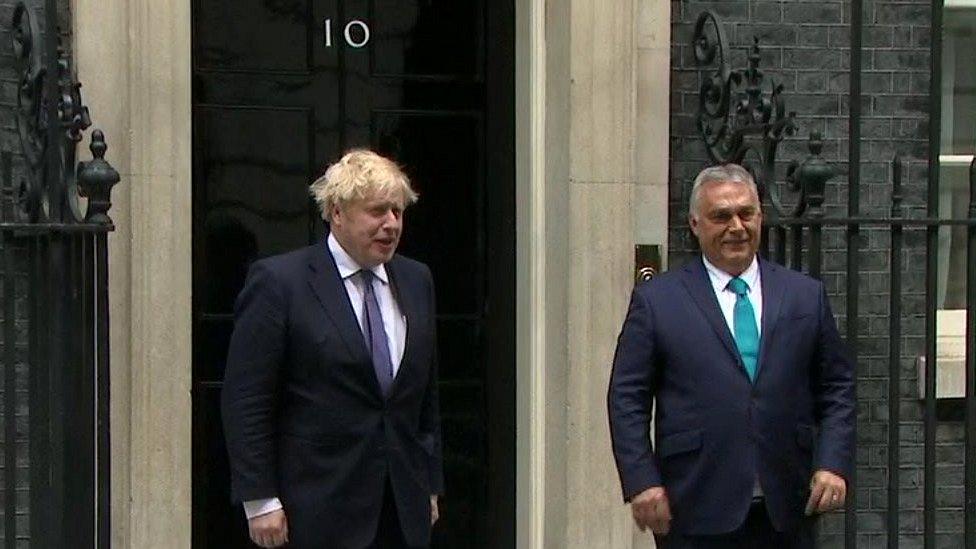Hungarian PM Orban defends anti-migrant remarks on UK visit
- Published
Viktor Orban in London in May 2021: I'm anti-immigration but not anti-Semitic
Hungary's Viktor Orban has ended a controversial visit to Boris Johnson by acknowledging he is anti-immigration and standing by an earlier condemnation of Muslim migrants as "invaders".
He said they had destroyed the border and marched through the country.
Downing Street said the UK prime minister had raised "significant concerns" about media freedom and human rights.
The visit prompted broad criticism from politicians and anti-racism groups.
Mr Johnson's opponents condemned the talks even before they took place, citing Mr Orban's treatment of press freedom and democratic values as well as his "Islamophobic" views on Muslim migrants.
But No 10 said Mr Johnson had brought up those issues, including LGBT rights and gender equality. Russia, Belarus and China were also discussed, it said, adding that Mr Orban had been urged to "promote democracy and stability".
"I said it's a Western democracy, so it's the same system as here," The Hungarian leader told reporters.
The right-wing Hungarian leader has courted China and is a close ally of Russian President Vladimir Putin, choosing to allow Covid-19 vaccinations with Russia's Sputnik V before it is given approval by the EU's medicines agency.
Last year he pushed the EU to lift sanctions on Belarus, although he backed this week's response by EU leaders to the Belarus leader's decision to force a Ryanair plane to divert and land so that a dissident journalist and his girlfriend could be arrested.
He has praised the UK's decision to leave the EU, and pulled his ruling Fidesz party out of the the EU's main centre-right grouping this year, after it was suspended over its human rights record.



Viktor Orban's visit to Downing Street has prompted much scratching of heads.
Why on Earth would Boris Johnson decide that he should be the second EU leader since Brexit to get a warm welcome at Downing Street?
There are several reasons.
The first, I am told, is that the Hungarian leader asked for the visit. It's been in the diary for a couple of months. And as one No 10 source said, you have to have a pretty good reason to say no to an EU head of government if they ask to see you.
Second, Mr Orban is also taking over the presidency of a group of central European countries known as the Visegrad 4.
And third, so the argument goes, the UK can't just talk to countries it agrees with.
But the visit may be seen by some in Europe as provocative, and it may sit uneasily with the government's agenda for its big G7 summit next month. Britain wants the G7 and its allies to do more to defend Western liberal democracy and its values.
Mr Orban is seen by some as the antithesis of that.

Hungary is currently ranked 92nd out of 180 countries on the Reporters without Borders World Press Freedom Index.
Pro-Orban supporters have taken control of Hungarian media in recent years and last year journalists walked out of the biggest remaining independent website, Index, accusing the government of trying to tame or destroy it.
The Orban government has also transferred a number of state universities to private control, while the Central European University (CEU), founded by liberal Hungarian-born philanthropist George Soros, has moved from Budapest to Vienna citing a "serious violation of academic freedom".
A poster campaign against Mr Soros was condemned for whipping up anti-Semitism. But Mr Orban on Friday denied allegations of anti-Semitism as ridiculous. "George Soros is a talented Hungarian businessman... he is very much in favour of migration, financing and helping the NGOs who are doing that. We don't like it but it has nothing to do with ethnic identity," he said.
UK Business Secretary Kwasi Kwarteng argued that the UK had to speak to all sorts of world leaders, even those whose values it might not share. "I think Viktor Orban's views on migrants are things that I would not endorse in any way," he told Sky News.
But Labour's foreign affairs spokeswoman Lisa Nandy was damning of the decision to invite him. "Turns out when you have no moral anchor, you end up adrift," she said, after Downing Street had condemned Mr Orban's comments on migrants as "divisive and wrong".
Liberal Democrat leader Sir Ed Davey wrote to Mr Johnson ahead of the meeting with a list of challenges he wanted put to the Hungarian leader. "Orban's rule has been marked by a sustained assault on Hungarian democracy, on press freedom and on human rights," he said.
Protesters from the Stand Up To Racism group stood outside Downing Street condemning the Hungarian leader.
Related topics
- Published28 May 2021

- Published28 May 2021
